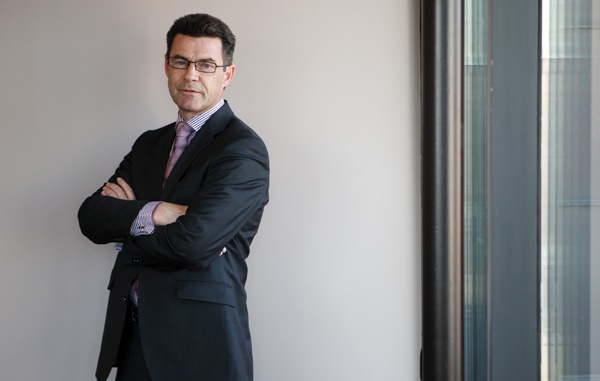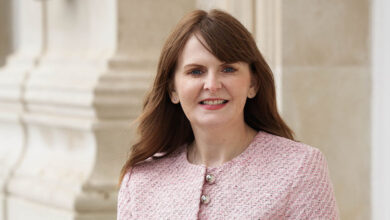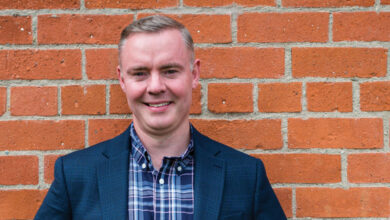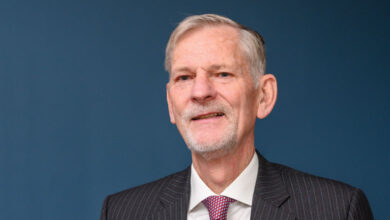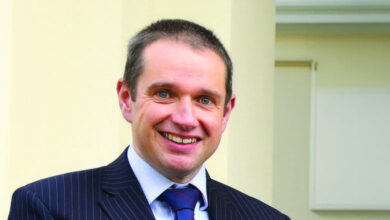A new era
Siemens’ energy chief Gary O’Callaghan explains the energy company’s vision for Irish electricity to Owen McQuade, pointing out how the island can practically fit into the new electricity age which has already begun.
The era of the new electricity age is dawning and Ireland must make its mark. We can “just” do enough to meet our CO2 targets, or we can go further and become a net exporter of energy, states Gary O’Callaghan. Siemens’ Head of Energy Sector sees the UK’s potential energy shortage in five years’ time as a real opportunity for Irish renewables and also predicts that telecommunications technology will eventually enable customers to control their home electricity use when they are out and about.
O’Callaghan remarks that with Siemens being a global organisation, it has a footprint “in every significant country around the world” and therefore can clearly see emerging ‘mega-trends’.
There are three significant trends effecting society today, within the Siemens world these are known as “mega-trends”. Firstly, with urbanisation, more people are moving to large cities and infrastructure is coming under more stress. This general trend is reflected nationally in the growth of Belfast and Dublin. The second is demographic change whereby people are living longer. While this is a positive development, it will put more stress on existing health services which are already under pressure. Finally, climate change presents a “very urgent need to decarbonise our environment.”
The firm has re-organised its work over the last 18 months to meet the challenges that result from these trends and energy has become a key focus for the company in Ireland. Responsibility for Northern Ireland has recently been transferred for practical reasons from the Great Britain branch of Siemens to the Irish arm.
“We want to show the people of Northern Ireland today the contribution we’re making in the Republic of Ireland and that’s the basis on which we are moving forward,” O’Callaghan states. “We want to make the contribution to the energy agenda. We want to be part of it. We want to form it, we want to shape the markets and also obviously for Siemens to promote its solutions and products and services.”
Within Ireland, there are three further trends or drivers affecting the energy sector which have been identified.
Energy security tops that list, given the island’s heavy reliance on fossil fuel imports. This was demonstrated by the dispute between Russia and the Ukraine in March 2005, which threatened Ireland’s gas supply: “This was a wake-up call and people started to realise that we do potentially have a very serious problem.”
The second driver is the CO2 energy agenda, and both Northern Ireland and the Republic of Ireland have shown responsibility and have set “very significant and serious targets” to cut carbon emissions by 2020, for which a “sharp increase” in renewable energy will be needed.
Finally, reducing cost and creating efficiency are related to the first point, particularly the cost of importing fossil fuels, the rising price of oil and gas and therefore the produced energy, and poor energy efficiency – in transmission networks as well as homes.
Innovation
“These three local trends or drivers coupled with the Siemens three megatrends, create a very significant case for doing something and there are very, very many questions that need to be answered,” he comments. The answers will have to involve new ways of generating, transmitting, distributing and using electricity, as well as finding new sources of electrical load as we move from fossil fuel based solutions to renewable energy solutions.
“Siemens, as an innovative company and as a technology leader, is taking this whole agenda and this environment very, very seriously and we’re pitching this as the new electricity age.”
The key areas which are the focus of the CO2 agenda are electricity generation, energy efficiency in buildings, transportation, heating and agriculture. It is unlikely agriculture will be able to respond to the same extent as the other areas, so to this end the other areas will have to over perform. This creates the focus on the areas of transport and heating, which will become new electrical loads in the future.
One recurring theme in our conversation was the concept of electric vehicles. Their relevance will be three-fold, in dramatically reducing the cost of motoring, cutting carbon emissions and also creating an extra source of electricity storage.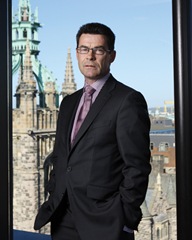
“The eCar and electrical heating become very important for Ireland in terms of leveraging their benefits against our very critical and significant, proportionately sized, agriculture industry.”
Ireland has a reputation for having the best wind resources in the world, with people in Siemens’ head office in Germany being well familiar with its “very arduous” conditions and their energy potential.
He is convinced that the island can become a market leader in renewable energy, given the example shown by Denmark in the 1980s. A massive expansion of their wind energy industry, which now employs 25,000 people, took place and it now covers the complete value chain, from sourcing materials, to manufacturing, design, production, logistics, installation, commissioning and operation.
O’Callaghan sees three main camps of thought on Irish renewables. Some see it as too “difficult, complex, costly” while the opposite view is that it is “clean, sufficient, abundant” and free from a fuel point of view.
The third approach, advocated by Siemens, is that the focus should not just be on the 2020 targets: “We should look beyond that and see renewable energy as an abundant natural resource for Ireland.”
While there are plenty of opportunities in Ireland for installation and operational maintenance in wind energy, there are not so many at this advanced stage in R&D and manufacturing. All this could change if the country made the decision to become a net exporter of electricity and therefore classify its ocean energy resources as “a natural resource to be tapped and to increase the wealth of the country”.
Opportunities abound in ocean energy with the island’s unique capacity to generate tidal and wave power. Resources off the west coast are among the richest in the world. However, there is also a “double-edged sword”; Ireland must take the initiative to develop its own industry.
“It’s there and it’s available to us but nobody else is going to develop the technology simply because no other country has the same resource or capacity as Ireland” he cautions. “We will have to show the leadership and courage to be a first mover.
“And if Ireland wants to make a decision collectively that we are going to take this natural resource – and are going to maximise it and export as much of it as we can – then we can start the value chain in ocean energy, start right at the beginning and build a massive industry around the island itself.”
This accelerated approach to developing renewables will naturally require increased interconnection with other markets but political leadership is also essential.
Politicians, he comments, tend to think within a five-year or seven-year timeframe but energy policy needs a plan for 2050, which involves the whole island and which starts now. Everything in energy policy needs to be “based or predicated” on achieving the goal of being a net exporter.
Super-grid
Strong interconnectors are needed between Northern Ireland and Scotland, between the Republic of Ireland and Wales, and the Republic of Ireland and France. On interconnection, O’Callaghan wants the island to be linked into the proposed super-grid off the North West coast of Europe, which is due to include Great Britain.
The end result would be electricity generated off Donegal, Derry, Mayo or Kerry being used by consumers in Poland, Germany and the Netherlands.
Closer to home, there is a guaranteed market in Britain between 2014 and 2025, when coal-fired plants will start to be decommissioned and nuclear will not yet be ready.
The Irish grid, though, needs to be ‘smarter’ i.e. using and transmitting electricity more efficiently and effectively: “If we’re generating energy off the coast of Derry and it’s going to be used in Waterford or in Wexford or in London, then the grid needs to be intelligent enough to know it’s got a generating capacity in Derry and it’s got a load in London. Homes and eCars will need to know when and how much renewable energy is being generated. This is all part of the smart grid concept where intelligent systems and applications will maximise our efficiency in the use of electrical energy. A smarter grid would also find and fix faults more effectively, as well as reducing wastage and loss.”
At a domestic level, this means a lot more than using a smart meter. Indeed, that device could act as a catalyst for new applications and technology. People could go about their day’s work with an iPhone and use an app to switch on their washing machine or water heater at home; it could also check how much electricity is being consumed in the house.
“We’re going to get a stage, I believe, in the future when most of what we do in our home will be based around the internet,” he says.
This approach would also allow customers to look for cheaper rates and thus choose their preferred suppliers more easily. Again, the eCar has a part to play in the smart grid concept as the same common user interface will be used on the internet, at home, on the iPhone and in-vehicle.
“We will start to embrace electricity as being the new fuel of the future and we will start to make it part of our day-to-day behaviours, day-to-day dialogue. It will become more and more part of our everyday lives and we will embrace it as being the new electricity age.”
Profile: Gary O’Callaghan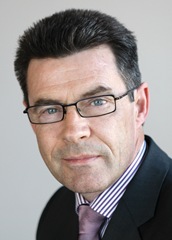
Born in Dublin, where his father worked in computing, he joined ESB as an apprentice electrician after leaving school. Having studied City & Guilds Electronics and Communications part-time he was offered a job with a computer company in Dublin. He worked there from 1981 to 1986, when he moved into service management.
The portfolio started to take on communications products and he moved into sales in 1989. In 1992, Gary joined Siemens and worked in enterprise communications, selling solutions and applications to Irish enterprise until 2004.
In that year, he was asked to take a look at embryonic business of energy, power transmission and distribution, which was then turning over about £3 million per year. Four years later, turnover was up to £35 million. Siemens decided to bring its Power Transmission and Distribution division and its Power Generation division together and grouped them as one ‘Energy Sector’.
“I was there when the revolution happened in communications and now I’m seeing the same thing happening in energy,” he quips. “This is going to be an amazing time for everyone, and the journey is just beginning”. Married to Fiona with three children, he plays golf and is currently studying for a Masters in Leadership Excellence at the University of Ulster.

